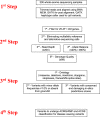Genetic testing in monogenic early-onset atrial fibrillation
- PMID: 37217627
- PMCID: PMC10325969
- DOI: 10.1038/s41431-023-01383-z
Genetic testing in monogenic early-onset atrial fibrillation
Abstract
A substantial proportion of atrial fibrillation (AF) cases cannot be explained by acquired AF risk factors. Limited guidelines exist that support routine genetic testing. We aim to determine the prevalence of likely pathogenic and pathogenic variants from AF genes with robust evidence in a well phenotyped early-onset AF population. We performed whole exome sequencing on 200 early-onset AF patients. Variants from exome sequencing in affected individuals were filtered in a multi-step process, prior to undergoing clinical classification using current ACMG/AMP guidelines. 200 AF individuals were recruited from St. Paul's Hospital and London Health Sciences Centre who were ≤ 60 years of age and without any acquired AF risk factors at the time of AF diagnosis. 94 of these AF individuals had very early-onset AF ( ≤ 45). Mean age of AF onset was 43.6 ± 9.4 years, 167 (83.5%) were male and 58 (29.0%) had a confirmed family history. There was a 3.0% diagnostic yield for identifying a likely pathogenic or pathogenic variant across AF genes with robust gene-to-disease association evidence. This study demonstrates the current diagnostic yield for identifying a monogenic cause for AF in a well-phenotyped early-onset AF cohort. Our findings suggest a potential clinical utility for offering different screening and treatment regimens in AF patients with an underlying monogenic defect. However, further work is needed to dissect the additional monogenic and polygenic determinants for patients without a genetic explanation for their AF despite the presence of specific genetic indicators such as young age of onset and/or positive family history.
© 2023. The Author(s), under exclusive licence to European Society of Human Genetics.
Conflict of interest statement
The authors declare no competing interests.
Figures



References
Publication types
MeSH terms
LinkOut - more resources
Full Text Sources
Medical

